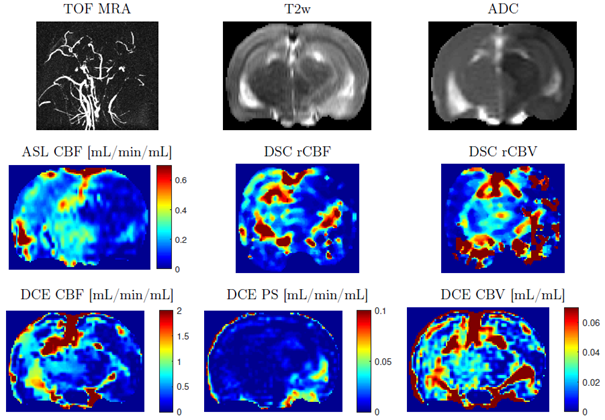Completion of the AZV 16-30299A project: Nanoliposomal systems for rapid diagnosis of thrombi by MRI

The project Nanoliposomal systems for rapid diagnosis of thrombi by MRI was completed and the results have been sent to Czech Health Research Council on February 1, 2021.
The objectives of the project were focused on the development of a rapid diagnostic method for thrombus imaging using MRI. The formation of thrombi in the bloodstream is the cause of very frequent diseases, such as stroke, myocardial infarction, deep vein thrombosis or pulmonary embolism. Our unique strategy has been to develop and subsequently validate the efficacy of nanoliposomal particles (containing contrast medium) that are specifically targeted for binding to thrombus fibrin fibres – using unique binding proteins.
The project was solved in close cooperation with four research teams. The Laboratory of Ligand Engineering at the Institute of Biotechnology of the Czech Academy of Sciences (IBT CAS) has developed small binding proteins for targeting contrast nanoliposomes to fibrin fibres. Binding proteins were used for surface modification of prepared contrast nanoliposomes at the Veterinary Research Institute (VRI), where the ability of binding and the selectivity of binding proteins themselves, and then the selectivity of targeted contrast nanoliposomes to fibrin fibres were further tested. Researchers at the International Clinical Research Centre of St. Anne’s University Hospital Brno (FNUSA-ICRC) implemented and optimized an animal model of thromboembolism in rats suitable for preclinical testing. The success of induction, localization and quantification of thrombolytic occlusion was detected and characterized by the MRI method at the Institute of Scientific Instruments of the Czech Academy of Sciences (ISI CAS).

Within the project, there was registered Patent No. 307452 (Aminooxylipids for the construction of self-assembly liposomal systems allowing their subsequent modification by biologically functional molecules).
In addition to publications in impacted periodicals, a chapter in a monograph, papers presented at national and international conferences, the results of the project led to valuable findings that significantly contribute to constructing the translational potential of this modern approach to diagnostics of serious diseases caused by a blood clot. The project led to the establishment of a multi-institutional and multidisciplinary consortium, which is the basis for further work on the development of modern nanoliposomal systems for clinical practice. With the intention of using the valuable knowledge of previous research, another grant application was submitted to AZV in 2020 with the intention of developing an effective nanoliposomal system for targeted delivery of drugs or contrast agents for dissolution or diagnosis of thrombus.